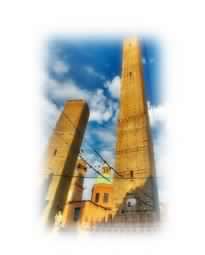
Bologna’s sightseeing
la dotta (museums, university and churches),
la rossa (buildings and the towers),
la grassa (specialties, restaurants and bars).
A simple and useful guide
Via Morgagni 10, 40122 Bologna – +39 051272672 – www.t7h.it
Overview
From our spectacular penthouse, it’s easy to reach by foot all the main monuments, squares and museum of Bologna. If you are interested in some attractions, museums, restaurants don’t hesitate to ask to our staff for help or infos.
We truly enjoy taking care of you and we will do our best to satisfy your requests and to realize your wishes while your staying in Bologna.
Here is a short guide to suggest you what to visit and to do during your stay in Bologna.
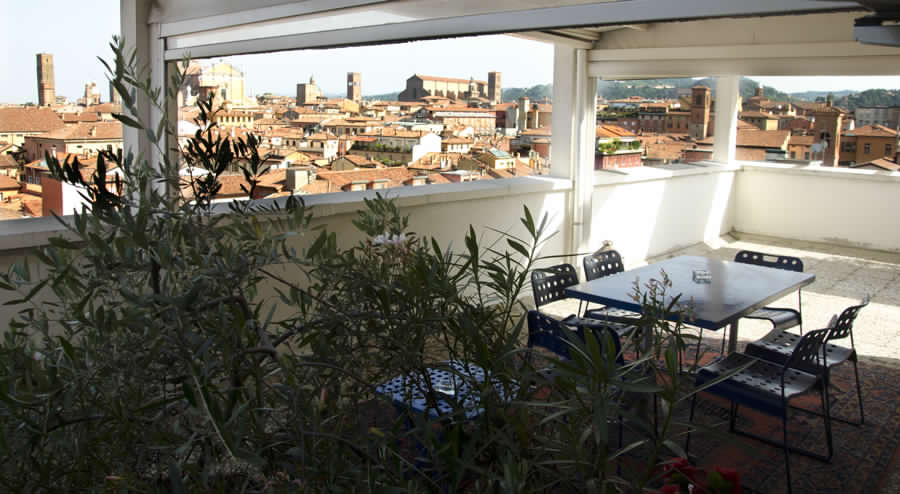
Bologna… something unforgettable!!!
Our favourite museums
As museums we can suggest our favourite museums, probably not the most famous in the city but the ones we are everyday glad to show to our friends and guest: they are the Medieval Museum (the age in wich Bologna flourished and was more famous than Paris) in Manzoni 4th street, the Archeological Museum (in the most famous underwalk of the city named Pavaglione Portico where you can see the old and wonderful library of Archiginnasio with iuts astonishing anatomical theatre in carved wood (where there was the faculty of Medicine of the oldest University of the world). If you like modern Art you can’t miss Mambo Museum too.
Museo Civico Medievale:
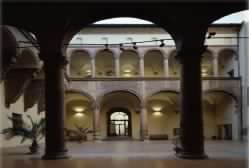 via Manzoni 4 – ph. 051 2193930 – 2193916
via Manzoni 4 – ph. 051 2193930 – 2193916
Open: from Tuesday to Friday: 9am-5pm;
Saturday, Sunday and holiday: 10am-6.30pm;
24th and 31st Dec 9pm-2pm
Museo Civico Archeologico:
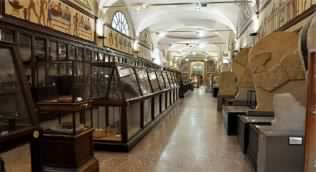
it has got one of the most important archaeological collections in Italy.
There is an Etruscan section, Greek and Roman art; there is also a unique collection of Egyptian antiquities, one of the most important of Europe.
Via dell’Archiginnasio 2 – ph. 051 2757211
open: Tuesday – Thursday: 9am-6.30pm;
Friday: 9am-10pm; Saturday, Sunday and holiday: 10am-6.30pm;
24th and 31st December: 9am-6.30pm
Mambo – Museo d’Arte Moderna di Bologna e Museo Morandi
via Don Minzoni 14 – ph. 051 6496611
Open Tuesday, Wednesday, Friday 12pm-6pm;
Thursday, Saturday, Sunday and holiday, 24th, 31st Dec: ore 12pm-8pm
Where to eat, our suggestions
 We have got a prestigious address, in a stylish and fashionable neighborhood, full of restaurants and bars .
We have got a prestigious address, in a stylish and fashionable neighborhood, full of restaurants and bars .
For a good breakfast, in via Riva di Reno, just 50 meters from the penthouse, there is a huge bakery, called “La Borbonica”…very tasty!!!
Our favourite restaurants
They are surely “Gigina” (not in the historical centre), “Da Nello” in via Montegrappa, “Merlò” via de Gombruti and, really close to the apartment, the Fresh Fish Market and “Mercato delle Erbe” (Vegetable Market).
Around the Market and inside the ancient Market you can find bars, little restaurants and wine bars for a tasty dinner or an aperitif!
Restaurants:
Trattoria della Gigina
Via Stendhal, 1 – Bologna
Phone: (+39) 051 322300
www.trattoriagigina.it
Ristorante Da Nello
Al Montegrappa
Via Monte Grappa, 2 – Bologna
Phone: (+39) 051 236331
www.ristorantedanello.com
Ristorante Merlò
Via de’ Gombruti, 2 – Bologna
Phone: (+39) 051 239645
www.ristorantemerlobologna.com
Banco 32 al Mercato delle Erbe
Via S. Gervasio, 3/A – Bologna
Phone: (+39) 051 269522
profilo facebook
Short Bologna’s timeline
The first settlements in Bologna date back to at least 1000 BC. The city has been an important urban center under the Etruscans and, after, under the Celts. Romans gave to Bologna the actual name “Bononia” and built roads and buildings that somewhere in the center you can see.
 Then, in the 5th century, after a long decline, Bologna was reborn and rebuilt under Bishop Petronius and in the Middle Ages it became a free municipality, the fifth largest European city based on population (bigger than Paris!).
Then, in the 5th century, after a long decline, Bologna was reborn and rebuilt under Bishop Petronius and in the Middle Ages it became a free municipality, the fifth largest European city based on population (bigger than Paris!).
Bologna has the oldest university of the world, founded in 1088, and has got the longest underwalk in the world, that brings to San Luca Basel. There are more or less twenty medieval defensive towers remained out of up to 200 that were built between the 12th and the 13th centuries. The most important and famous one, that became the symbol ot the town, is the Torre Asinelli from the name of the richest family who built the tallest tower of the city.
Defensive towers and ancient churches
Defensive towers and ancient churches is what we recommend to see: Santo Stefano church, San Pietro Dome and San Petronio church, San Luca Sanctuary, Torre Asinelli, Re Enzo palace.

This is the view from S. Peter’s church, a unique view of the major square (piazza Maggiore), of the biggest church of Bologna (San Petronio Church), of Palazzo Re Enzo and Palazzo d’Accursio.
The most famous tower in Bologna is the Asinelli tower, that is the tallest one but also the most visited and it’s often crowded and, to get in, there are often long queues. To avoid the touristic flows, on Saturday afternoon it’s possible to visit another stunning tower, in via Avesella, on the back of the cathedral of S.Peter.
Here are some pics from the guided tour of St. Peter’s bell tower.

 As you can see, from this tower you can have a 360 degrees view of the city and a professional guide will wait you at the top of the tower, to tell you the fascinating history of this magic place.
As you can see, from this tower you can have a 360 degrees view of the city and a professional guide will wait you at the top of the tower, to tell you the fascinating history of this magic place.
Santo Stefano Church or The Seven Churches – Piazza Santo Stefano
Opening: All days from 8 a.m. to 7 p.m.
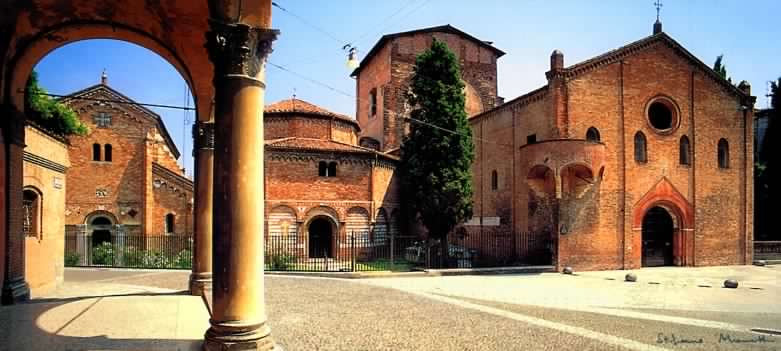
Santo Stefano church is the most particular church and perhaps monument in Bologna. It’ s also called The Seventh Churches because of the seven parts of which it has been constructed from the Middle Ages and first on a Roman Isis Temple.
According to tradition Saint Petronius, a bishop of the city during the 5th century, built the basilica over a temple of the goddess Isis. The saint wished to have a building that recalled the Church of the Holy Sepulchre in Jerusalem.
The different parts of the complex include:
• Church of Saint John the Baptist or of the Holy Crucifix (8th century)
• Church of the Holy Sepulchre (according to tradition: 5th century)
• Church of the Saints Vitale and Agricola (4th century, rebuilt first in the 12th century)
• Courtyard of Pilate (“Santo Giardino”, 13th century)
• Church of the Trinity or of the Martyrium (13th century)
• Chapel of the Bandage (“Cappella della Benda”) dedicated to the strip of cloth worn around the head by the Virgin Mary as a sign of mourning.
Pilate’s Courtyard recalls the lithostrotos, where Jesus was condemned; it leads to the Church of the Holy Sepulchre. In the center, a basin called the “Catino di Pilato”, a Lombard work from 737-744.
Sanctuary of the Madonna of San Luca
Opening: All days from 7 a.m. to 7 p.m.
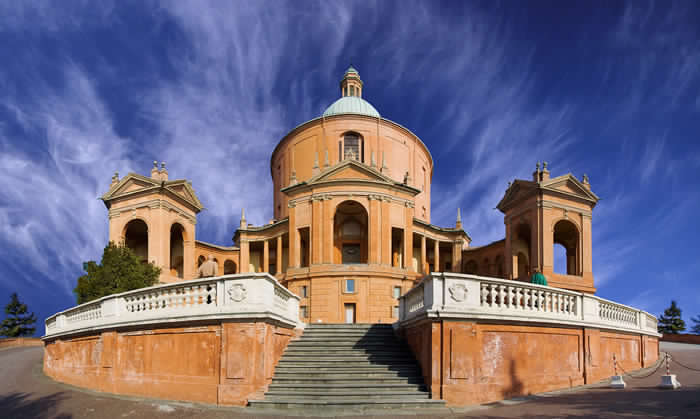
The Sanctuary of the Madonna of San Luca is a basilica church, sited atop the hill Monte della Guardia, some 300 metres above the city, along the road called Via Saragozza.
While a road now leads up to the sanctuary, it is also possible to reach it along a (3.8 km) monumental roofed arcade (Portico di San Luca) consisting of 666 arches, which was built in 1674-1793.
The present church was constructed in 1723 using the designs of Carlo Francesco Dotti. The lateral external tribunes were built by Carlo Francesco’s son, Giovanni Giacomo, using his father’s plans.
 From 1931 to 1976 an aerial cable car operated from the base of the hill on the outskirts of Bologna, to the summit. The total distance covered in the 7 minute travel time was 1328m with a vertical difference of 220m. The operation was closed due to increased usage of private transport to ascend the hill. The top station is abandoned but intact, the bottom station has been converted into apartments but remains structurally the same, and the single pylon remains intact in a field.
From 1931 to 1976 an aerial cable car operated from the base of the hill on the outskirts of Bologna, to the summit. The total distance covered in the 7 minute travel time was 1328m with a vertical difference of 220m. The operation was closed due to increased usage of private transport to ascend the hill. The top station is abandoned but intact, the bottom station has been converted into apartments but remains structurally the same, and the single pylon remains intact in a field.
Hidden Bologna: Michelangelo and Cimabue in Bologna
We usually associate the name of Michelangelo with Florence and Rome, where the great Renaissance artist was most active, leaving outstanding works of art.
However, not many people know that, at some point during his career, Michelangelo spent his time in Bologna – twice to be precise – and left some works of art here too. The first time Michelangelo came to Bologna was after the death of Lorenzo de’ Medici (1492), when he found himself with no patrons and no salary. The young artist decided to try his luck in Venice, but nobody wanted to commission him any work.
On his way back to Tuscany, passing through Bologna, he was stopped at customs and fined for not having paid the entry tax.
A Bolognese senator, the wealthy Giovan Francesco Aldrovandi, witnessed what was happening, paid the fine for the penniless Tuscan and offered him a job: to be a lecturer at his house for the works of Tuscan literary masters Dante, Petrarch and Boccaccio, so he wouldn’t have to hear them read with a Bolognese accent.
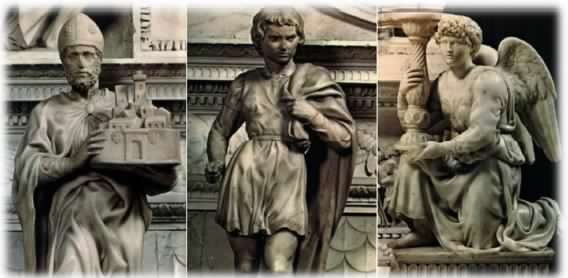
Thanks to Aldrovandi’s connections, Michelangelo was assigned the task of making three small sculptures (Saint Petronius, Saint Proclus and an angel holding a torch) for the Arca di San Domenico (Ark of Saint Dominic), the monumental tomb containing the remains of Saint Dominic, to which other major artists of the time contributed.
The monument is one of Bologna’s most important pieces of art, and this is how Bologna too can boast some art by Michelangelo.
Where can you see it? In the Basilica of San Domenico, on the piazza by the same name.
 Outside the Basilica of San Domenico you can find some particular high tombs: these are the tombs of glossators (that you can find outside the beautiful romanic Basilica of San Francesco, placed in Piazza San Francesco), the most important professor of the ancient University in Bologna, in particular in Law and Arts (medicine, philosophy, arithmetic, astronomy, logic, rhetoric and gramma).
Outside the Basilica of San Domenico you can find some particular high tombs: these are the tombs of glossators (that you can find outside the beautiful romanic Basilica of San Francesco, placed in Piazza San Francesco), the most important professor of the ancient University in Bologna, in particular in Law and Arts (medicine, philosophy, arithmetic, astronomy, logic, rhetoric and gramma).
In Bologna you can see also a painting of Cimabue in the wonderful church of Santa Maria dei Servi in Strada Maggiore, where, during Christams time, there is a famous Christmas market named “Santa Lucia’ Christmas Market”.

